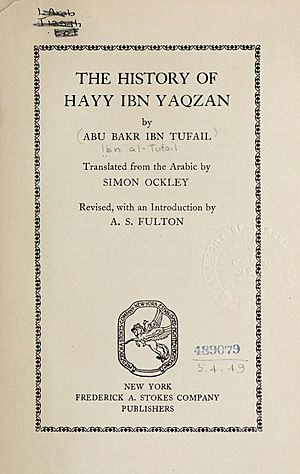Hayy ibn Yaqdhan facts for kids

Frontispiece of the Simon Ockley translation from 1708 (re-published in 1929)
|
|
| Author | Ibn Tufail |
|---|---|
| Original title | حي بن يقظان |
| Language | Arabic |
| Genre | Philosophy |
|
Publication date
|
around 1160 CE (555 AH) |
Ḥayy ibn Yaqẓān (which means "Alive, son of Awake" in Arabic) is an old Arabic story. It's a special kind of philosophical novel, like a long story that teaches big ideas. It was written by a person named Ibn Tufail around the 12th century in a place called Al-Andalus (which is now Spain and Portugal).
This book is also known by other names, like The Self-Taught Philosopher. It was named after an older story by Avicenna, but the two stories are different. Ḥayy ibn Yaqẓān was very important for Islamic philosophy. It also inspired many thinkers during the Age of Enlightenment in Europe. It's one of the most translated Arabic books, after the Quran and One Thousand and One Nights.
Contents
The Story's History
Ḥayy ibn Yaqẓān is one of the few writings left by Ibn Tufail. He lived during the time of the Almohad Caliphate and worked for Sultan Abu Yaqub Yusuf. This book became very popular in Europe much later.
- In 1671, a Latin translation was published by Edward Pococke Jr..
- Then, in 1674, George Keith translated it into English.
- Famous thinkers like Baruch Spinoza and Gottfried Wilhelm Leibniz also liked the book.
- Daniel Defoe, who wrote Robinson Crusoe, was greatly inspired by this story. He also got ideas from the real-life adventures of a Scottish sailor named Alexander Selkirk.
In the Muslim world, this book is seen as an important Sufi text. Sufism is a mystical branch of Islam.
What the Story is About
The story is about a boy named Ḥayy ibn Yaqẓān. He grows up all alone on an island near the equator. An antelope raises him, feeding him her milk.
- Ḥayy learns to walk and copies the sounds of animals around him.
- He learns their ways and how to act by watching them.
- He makes his own clothes and shoes from animal skins.
- He studies the stars and learns a lot about nature.
- By watching animals and his surroundings, he gains great knowledge. He learns about science, philosophy, and even religion.
- He figures out that a great creator must have made the universe.
- Ḥayy lives a simple life, like a Sufi, and chooses not to eat meat.
When he is 30 years old, he meets another human for the first time. This person lands on his isolated island. By the time Ḥayy is 49, he is ready to share all the amazing things he has learned with other people.
Big Ideas in the Book
Ḥayy ibn Yaqẓān is an allegory. This means it uses a story with symbols to explain deep philosophical and mystical ideas. It's Ibn Tufail's most important work because it shows his main ideas.
Ibn Tufail knew about different ideas from thinkers like Al-Ghazali and others. In Ḥayy ibn Yaqẓān, he tried to bring together different Islamic ideas. He wanted to show that religious beliefs and scientific thinking could work together. He also used ideas from another philosopher, Ibn Sina, like the "Floating Man" idea, but he changed it to focus on being isolated from society.
Through this story, Ibn Tufail explored three main questions of his time:
- Can humans learn and grow to be truly wise just by observing nature and thinking, without formal schooling? The story suggests yes.
- Does what we learn from observing, experimenting, and thinking go against religious teachings? The book says no, that religion and science can agree.
- Can any person find deep, true knowledge on their own? The story suggests that this journey is personal and possible for anyone.
Lasting Impact
Ḥayy ibn Yaqẓān had a huge impact on Arabic literature and early Islamic philosophy. It also influenced European literature during the Age of Enlightenment. It became very popular in the 17th and 18th centuries.
The novel especially influenced important thinkers in Western philosophy and the Scientific Revolution. People like Thomas Hobbes, John Locke, Isaac Newton, and Immanuel Kant were inspired by it.
- The book's ideas about how people learn helped shape John Locke's concept of tabula rasa. This idea says that people are born with a "blank slate" mind and learn everything through experience.
- The first English translation by Simon Ockley also inspired the famous "desert island" story of Daniel Defoe's Robinson Crusoe.
English Translations
Here are some of the English translations of the book:
- George Keith. 1674.
- Ockley, Simon. 1708. The Improvement of Human Reason: Exhibited in the Life of Hai Ebn Yokdhan.
- Goodman, Lenn Evan. 1972. Ibn Tufayl's Hayy ibn Yaqzān: A Philosophical Tale.
- Kocache, Riad. 1982. The journey of the soul: the story of Hai bin Yaqzan.
- Colville, Jim. 1999. Two Andalusian Philosophers.
- Khalidi, Muhammad Ali, ed. 2005. Medieval Islamic Philosophical Writings.
Other Translations
The book has also been translated into many other languages:
- Dutch: Reelant, Adriaan. 1701. De natuurlijke wijsgeer.
- German: Schaerer, Patric O. 2004. Der Philosoph als Autodidakt.
- German: Abdeljelil, Jameleddine Ben, and Viktoria Frysak, eds. 2007. Hayy Ibn Yaqdhan. Ein muslimischer Inselroman.
- Modern Greek: Kalligas, Pavlos. 2018. Ο δρόμος του λόγου: Χάυυ Ιμπν Γιακζάν ή Τα μυστικά της φιλοσοφίας της Ανατολής.
- Portuguese: Loureiro, Isabel. 2005. O filósofo autodidata.
See also
 In Spanish: El filósofo autodidacta para niños
In Spanish: El filósofo autodidacta para niños
- Arabic literature
- Andalusi literature
- Arabic epic literature
- The forbidden experiment (linguistics)
 | John T. Biggers |
 | Thomas Blackshear |
 | Mark Bradford |
 | Beverly Buchanan |

